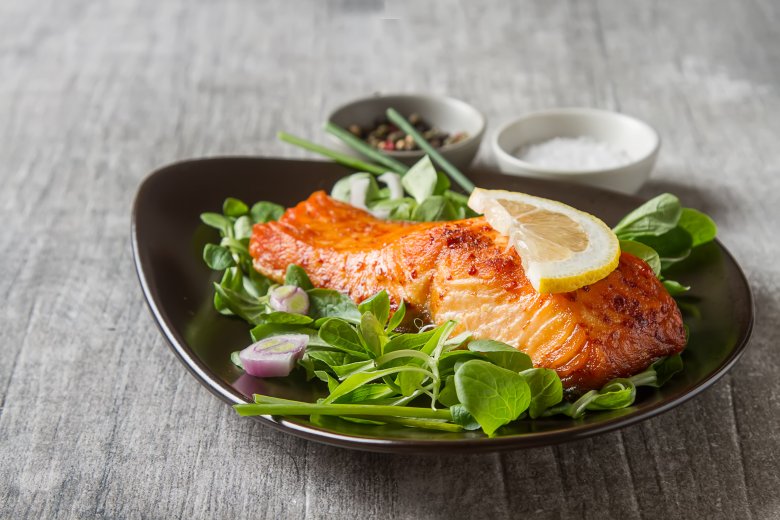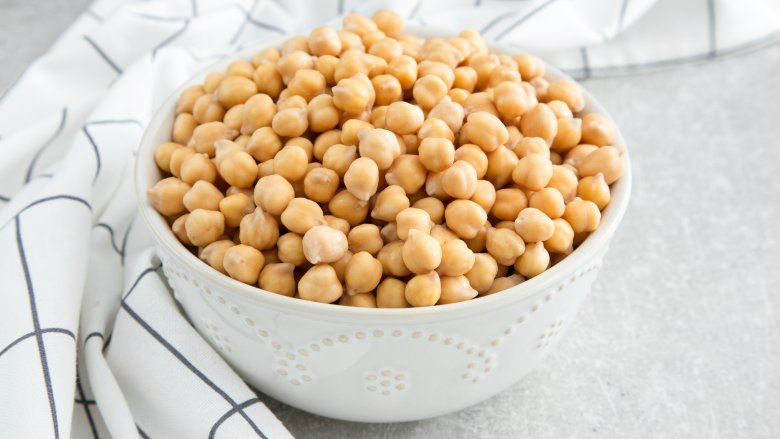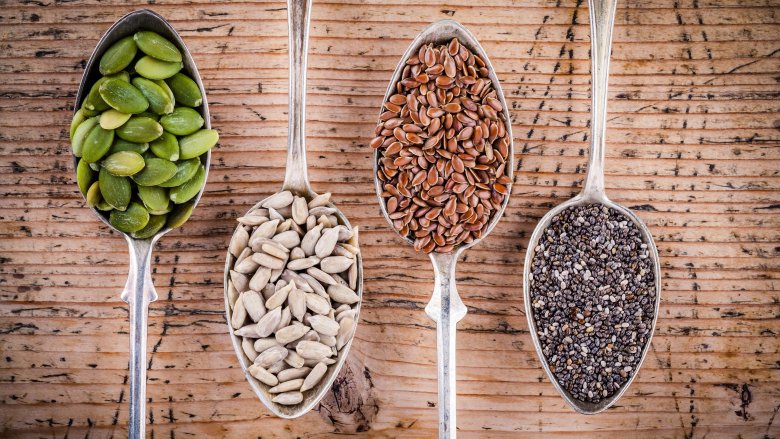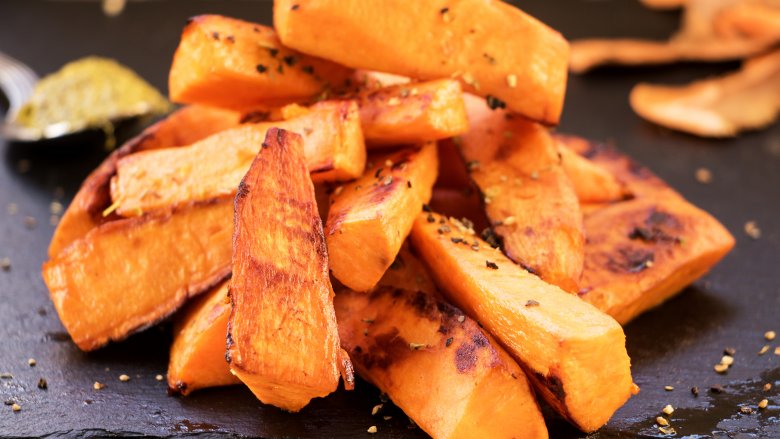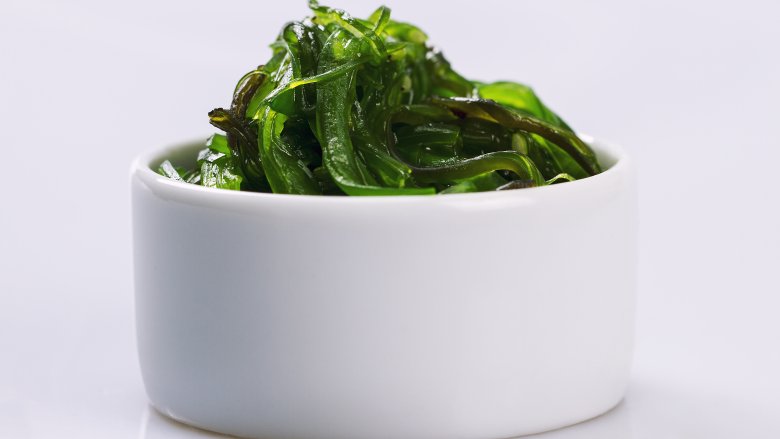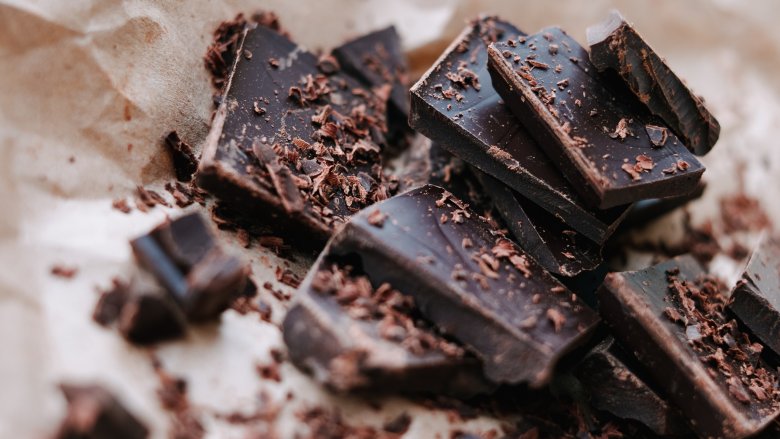Foods You Should Start Eating Every Day
We may receive a commission on purchases made from links.
Let's be real. Maintaining a healthy lifestyle is no walk in the park. Between squeezing in time for the gym during your busy work week to fighting off those stress-induced cravings (hello, large pepperoni pizza), it's tough to be on point all the time. And when you finally make a commitment to put those healthy habits into practice, it can be easy to focus on everything you're giving up in the name of wellness (farewell, Hump Day happy hour), leaving you feeling defeated. Yes, the struggle is real, but falling into a negative mindset will get you nowhere, especially when it comes to losing weight and getting healthy. In fact, a U.K. study measured the cravings of 129 women — some who were "dieting" to lose weight and some who were simply "watching" their weight without dieting — and found that, compared to the non-dieters, the dieters experienced more intense cravings for all the foods that were off-limits.
Moral of the story: focusing on restriction will not only make dieting miserable, it could actually sabotage your weight loss goals. So, instead of focusing on swearing off everything that's "bad," why not focus on adding more healthy options into your life? Here are several yummy (and nutritious) foods to start eating every day.
Leafy greens
Spinach, kale, arugula, oh my! According to Gisela Bouvier, a registered dietician and the face behind B Nutrition & Wellness, leafy green vegetables and lettuces provide boat loads of vitamins, minerals, and fiber to your everyday diet. She recommends incorporating them into your breakfast omelets, lunch salads and as dinner sides as an excellent way to ensure great phytonutrient intake daily.
To get even more nutrients, registered dietitian and physical therapist Rachel Cutts says darker greens reign supreme. "One cup of cooked kale is a powerhouse with 53.3mg of vitamin C, more than 50 percent of the recommended intake to help your immune system during this flu season," she told me in an interview.
Nuts
Nuts are one of my favorite foods to snack on, so I must admit I was a little excited when Rebecca Lewis, in-house dietitian at HelloFresh, mentioned them as one of her go-to foods. "Nuts contain powerful antioxidants to clean up the damage in our bodies, cholesterol lowering phytochemicals, and high levels of anti-inflammatories such as omega-3 fatty acids," she told me. She also noted that studies have shown nuts can help control your weight by helping prevent the hunger pangs that typically lead to snacking and overeating.
Bouvier is also a fan of nuts, specifically almonds. "Almonds are an easy and portable snack that can be eaten everyday and anywhere," she said. "They are packed full of monounsaturated fat, which helps to increase high density lipoproteins, also known as good cholesterol, and lower bad cholesterol. Each serving also contains six grams of plant-based protein."
Eggs
Eggs haven't always had the best reputation, but new research shows this go-to breakfast food may actually be healthier than we once imagined. "Eggs are an amazing protein source," said Bouvier. And while cholesterol in eggs used to be a concern, Bouvier explained to me, "It has been found that they are perfectly safe and can actually help raise good cholesterol levels." She noted that one egg provides six grams of quality protein to your daily diet.
Berries
From strawberries to blackberries and everything in between, these little morsels of fruity goodness are not only delicious, they're also packed with nutrients. "Berries are an excellent source of fiber, vitamins, minerals and antioxidants," said Bouvier. "Whether they are fresh or frozen berries, adding them to breakfast cereal, yogurt, or a smoothie can be an excellent way to add great nutrition to your daily diet."
Chelsey Amer, a NYC-based registered dietitian and the creator of C It Nutritionally, agrees. "Berries are my go-to fruit each and every day because they're full of fiber and lower in sugar, plus full of tons of antioxidants, which helps reduce the stress your body naturally undergoes everyday," she told me. "Plus, berries are sweet and delicious and so versatile."
Avocado
Guacamole lovers, rejoice! Your favorite taco night staple might not be so bad after all. "We have been told to 'fear fat' for so long that I often find many of my clients eat very low-fat diets and are unsatisfied, which leads to mindless snacking," explained Amer. "I suggest including more healthy fats like avocado, which contain heart-healthy monounsaturated fat that help reduce your risk of heart disease and boost satiation and satisfaction after a meal."
Beans
If you're looking to add more non-animal protein to your diet, beans are a great way to do just that. "Beans are a fabulous source of vegetarian protein and fiber — two nutrients that help you stay full and satisfied (a bonus when watching your weight)," said Lewis. "The protein and fiber in beans can also stabilize the rise in blood sugar that occurs after eating, which can also help stabilize mood." She also adds that as a meat substitute, beans are a rich source of iron, as well as a good source of magnesium and potassium — nutrients that work together to lower blood pressure, maintain healthy cholesterol, and keep your heart and blood vessels healthy.
Fermented foods
If your favorite part of a hot dog has always been a giant dollop of sauerkraut, you may be on to something. According to Lewis, fermented foods (like sauerkraut) have recently gotten a lot of attention in the health food world. "With increased interest and scientific research to support the importance of gut health, probiotic-rich fermented foods have been enthusiastically called the new cure-all," she told me. She also explained that the fermentation process of foods like sauerkraut, kimchi, yogurt, and kombucha develop probiotics that keep the immune system safe, reduce inflammation, and directly influence the hormones our brains release, like cortisol (our stress hormone), ghrelin (our hunger hormone), and serotonin (our happiness hormone).
Oats
With hundreds of studies outlying the many health benefits of oats, it's no wonder Grace Derocha, a registered dietitian and certified diabetes educator at Blue Cross Blue Shield of Michigan, recommends this grain to her clients. "Oats are a great way to enjoy breakfast and keep you full until lunch," she told me. "They are high in fiber and are known to help lower cholesterol due to the beta-glucan, which is an insoluble fiber naturally found in this healthy grain."
If you think oats are just for breakfast, think again. "You can enjoy a savory oatmeal for lunch or dinner to mix it up," Derocha suggested.
Apples
An apple a day can really keep the doctor away, according to Julie Rothenberg, a registered dietician based in South Florida. "Soluble fiber in apples helps to lower our bad cholesterol (LDL) levels and keep our bowel movements regular," she said. Rothenberg also noted that apples contain both soluble and insoluble fiber, which helps us to feel fuller for longer periods of time (helping with weight management).
Oily fish
Love yourself some seafood? You're in luck because according to registered dietician Tori Schmitt, MS, RDN, LD, of YES Nutrition, fish — particularly oily varieties like salmon, tuna, and mackerel — offer a slew of health benefits. "Full of healthy omega-3 fatty acids, oily fish may decrease blood triglyceride levels and help protect against heart disease," she told me in an interview. What's more, they're a good source of Vitamin D, which may help protect your vision, as well as ward off dementia.
Pulses
Hummus lovers, rejoice. According to Schmitt, all of us could benefit from eating more pulses, which include dry peas, lentils and chickpeas, and are also known as the main ingredient in our dearly beloved hummus. "Offering a healthy source of carbohydrates — these babies are loaded with fiber — pulses also deliver protein to help you feel fuller, longer, at your meals and snacks," she said. "Pair your vegetables with hummus or add lentils to your favorite soup."
Seeds
When I started eating healthier, one of the first changes I made was ditching croutons. Since then I've discovered a plethora of yummy seeds (from chia, to pumpkin, to sunflower) that add the perfect crunch to my lunch salad. That's why I was so excited when Schmitt told me seeds are one of her go-to food items. "[Seeds] not only offer protein and healthy fats, but they also deliver magnesium — mother nature's stress relaxer — functioning in opposition to calcium to help calm your muscles and your body from the inside out."
Amer also loves seeds, saying, "I'm a big fan of pumpkin seeds because they are portable, convenient, easy to find, and loaded with nutritious benefits! Pumpkin seeds are a source of zinc, which helps boost your immune system (especially important in the winter months) and one serving provides almost 50 percent of your daily magnesium needs." Just be sure to watch your portion size, she advises, "One-quarter cup of pumpkin seeds contains almost 200 calories."
Sweet potato
This versatile starchy vegetable tops the list of favorites for Amer. "I don't think a day goes by that I don't have at least a bite of a sweet potato or yam," she told me. "They are an inexpensive way to boost your intake of vitamins A and C, fiber and potassium, all of which provide a variety of health benefits from eye health and heart health, immune system support and diabetes prevention. Most importantly, she adds, "I never eat a sweet potato and feel unsatisfied after my meal, which is key to maintaining a healthy diet!"
Kelp
If you've never tried this seaweed, which is most popular in Asian countries, Dr. Joel Kahn of the True Health Initiative says you are missing out. "The hype is real," he told me via email. "This protein-packed, sustainable, plant-based, gluten-free, zero-junk ingredient should be added to your repertoire." Dr. Kahn suggests using kelp noodles to replace lo mein or spaghetti for a healthier version of your favorites. He adds, "You'll also be able to get your hands on some kelp jerky soon from the folks at Greenwave."
Chocolate
Eating chocolate every day? Sign me up! But before you go place a bulk candy order from Amazon, make sure you're sticking to the good stuff. That means, according to Kahn, 100 percent chocolate.
"Ditching sugar doesn't have to mean breaking up with chocolate," he said. "Many chocolatiers make a 100 percent cacao bar with no added sugar that is just as flavorful and high in antioxidants as their 70 to 90 percent dark chocolate counterparts. His favorite? "Try the François Pralus bar and avoid lower quality unsweetened varieties you find in the baking section at your grocery store."










